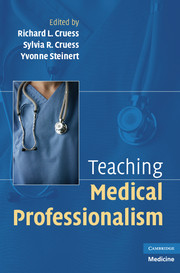Book contents
- Frontmatter
- Contents
- List of Contributors
- Foreword by William M. Sullivan
- Introduction
- PART ONE WHAT IS TO BE TAUGHT
- PART TWO THEORY
- PART THREE PRINCIPLES
- PART FOUR PRACTICE: CASE STUDIES IN TEACHING PROFESSIONALISM ACROSS THE CONTINUUM
- 12 Teaching Professionalism in a Traditional or Organ-Based Curriculum
- 13 Learning Professionalism in a Problem-Based Curriculum
- 14 Teaching Professionalism and Fostering Professional Values during Residency: The McGill Experience
- 15 Continuing Professional Development: A Focus on Professionalism
- APPENDIX A Definitions of Professionalism
- APPENDIX B Core Attributes of Professionalism
- APPENDIX C The Teaching of Professionalism: Vignettes for Discussion
- APPENDIX D A Matrix for “Matching” Teaching Methods to Attributes
- APPENDIX E Sample Grid for Use with Discussion of Vignettes
- APPENDIX F Sample Questions to Guide Discussion about the Social Contract: Small-Group Leaders' Guide with Suggested Responses
- APPENDIX G Professionalism Program for Residents: Suggested Outline for Small Group Facilitators
- APPENDIX H Sample Evaluation Form for Residents' Half-Day Program on Professionalism
- Index
- References
14 - Teaching Professionalism and Fostering Professional Values during Residency: The McGill Experience
Published online by Cambridge University Press: 01 September 2009
- Frontmatter
- Contents
- List of Contributors
- Foreword by William M. Sullivan
- Introduction
- PART ONE WHAT IS TO BE TAUGHT
- PART TWO THEORY
- PART THREE PRINCIPLES
- PART FOUR PRACTICE: CASE STUDIES IN TEACHING PROFESSIONALISM ACROSS THE CONTINUUM
- 12 Teaching Professionalism in a Traditional or Organ-Based Curriculum
- 13 Learning Professionalism in a Problem-Based Curriculum
- 14 Teaching Professionalism and Fostering Professional Values during Residency: The McGill Experience
- 15 Continuing Professional Development: A Focus on Professionalism
- APPENDIX A Definitions of Professionalism
- APPENDIX B Core Attributes of Professionalism
- APPENDIX C The Teaching of Professionalism: Vignettes for Discussion
- APPENDIX D A Matrix for “Matching” Teaching Methods to Attributes
- APPENDIX E Sample Grid for Use with Discussion of Vignettes
- APPENDIX F Sample Questions to Guide Discussion about the Social Contract: Small-Group Leaders' Guide with Suggested Responses
- APPENDIX G Professionalism Program for Residents: Suggested Outline for Small Group Facilitators
- APPENDIX H Sample Evaluation Form for Residents' Half-Day Program on Professionalism
- Index
- References
Summary
Learning how to be a professional is a vital part of residency training. Although professional socialization starts in medical school, professional attitudes and behaviors are internalized during residency as the resident learns medicine over a period of years of supervised practice. Providing illustrations from McGill University, this chapter will present a model of how professionalism can be taught and evaluated at the postgraduate or residency level and address lessons learned.
THE CONTEXT
Professionalism is a standard for accreditation of postgraduate programs in most Western countries, as found, for example, in the CanMEDS roles for specialty residencies in Canada, and the Accreditation Council for Graduate Medical Education's competencies in the United States. Other countries use documents such as the General Medical Council's “Good Medical Practice” in the United Kingdom or the Charter on Professionalism to outline appropriate professional behaviors for all physicians. As such, the curricular content for a residency program is broadly outlined, and there is an expectation that residents' professional behaviors will be assessed. National residency accrediting bodies usually include a general definition of “professionalism” in their standards. As well, these bodies usually describe elements of professionalism, including concepts relating to professional attributes and humanistic behaviors, professional relationships (e.g., the social contract), the organizational and legal aspects of professionalism (e.g., profession-led regulation), ethical principles and practice, sensitivity to diversity, and physician health and sustainable practice.
In Canada, both the Royal College of Physicians and Surgeons and the College of Family Physicians have mandated all residency programs to teach and evaluate professionalism.
- Type
- Chapter
- Information
- Teaching Medical Professionalism , pp. 246 - 262Publisher: Cambridge University PressPrint publication year: 2008
References
- 5
- Cited by



